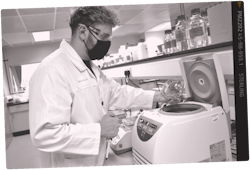Sterling Pharma Solutions: Paving a better way
If there is a promising new technology out there, Sterling will find a way for pharma to use it.
Through a dedicated Technology and Innovation program, Sterling Pharma Solutions seeks out and sorts through soon-to-be in-demand technologies for pharmaceutical development and manufacturing.
The program, which was launched in 2013, is led by Mark Muldowney, Sterling’s Head of Innovation and resident ‘technology talent scout.’ Muldowney is tasked with exploring new technologies and determining which are best suited to the pharma market and Sterling’s capabilities, and then making sure they can be successfully applied to client programs.
The job involves bringing together the right technology partners — including local academic institutions — and Sterling’s pharma clients.
“I approach local universities to start the ball rolling. Then, if a customer comes to us and says, ‘we would like to do this, can you do it or do you know somebody who can help us do it?’ that’s where I come in — to bring all the parties together,” says Muldowney.
Top of technology mind for the UK-based global CDMO lately has been biocatalysis — the use of enzymes as catalysts, rather than more traditional transition-metal catalysts, to speed up chemical reactions.
The concept is certainly not new; it dates back to ancient civilizations using yeast enzymes to brew beer. A comprehensive understanding of the science behind what was accelerating these processes came in 1833, when French scientists working in a sugar factory were able to isolate and purify enzymes.
However, it’s only in the last decade that the technology has begun to pick up speed in the pharma industry. Several major drugs, such as Pfizer’s Lipitor and Lyrica as well as Merck & Co.’s Singulair, Victrelis and Januvia, are manufactured using enzymatic steps. The use of biocatalysts can offer pharma compelling advantages including improved efficiency, reduced costs, customization capabilities and improved sustainability.
Supported by its Innovation program, Sterling has been intently focused on extending its biocatalysis offerings. When the University of Manchester Institute of Biotechnology (MIB) came looking for a partner on a time-sensitive Bill & Melinda Gates Foundation-funded project, Sterling was ready.
“The opportunity came about at a great time. We’re continuing to build out our capability in biocatalysis and this partnership offered us the opportunity to work with the Manchester team to continue exploring and expanding our capability in that regard,” says Muldowney.
The $500,000 project is targeting a low-cost manufacturing route to molnupiravir, a COVID-19 therapy co-developed by Merck & Co. and Ridgeback Biotherapeutics. Researchers from MIB developed an efficient biocatalytic route to molnupiravir, and they turned to Sterling to provide chemical scale-up and process development expertise.
Not only is the partnership a prime opportunity for Sterling to play a role in facilitating global access to a lifesaving antiviral treatment, more broadly, it shows how foresight and dedication to new technology can pay off.
Scaling up molnupiravir
Sterling’s new process development labs in Dudley, UK will be equipped to develop commercial-scale processes for customers using biocatalysis.
Despite the incredible recent advancements the pharma industry has made in vaccine development, several factors have caused vaccines to fall short of being pandemic-ending silver bullets. In many lower-income countries, for example, manufacturing, storage and logistical challenges have severely hindered vaccine access.
Hence, effective therapeutics for COVID-19 treatment have also become an important part of the pandemic-fighting arsenal. There are currently two FDA-authorized oral antivirals for COVID-19 treatment. These can be taken at home to reduce infection severity and prevent hospitalization, and don’t come with the storage and distribution challenges of vaccines — making them a game-changer in lower-income countries.
But the affordable mass production of antivirals will also be challenging, so scientists have turned to biocatalytic strategies in hopes of finding a more efficient and cost-effective way to produce antivirals on a large scale.
“There are no chemical catalysts that have yet been developed that approach the power of enzyme catalyst,” says Nicholas Turner, professor of Chemical Biology at the University of Manchester. “Despite 50 years of fantastic Nobel Prize-winning research on novel chemical catalysts, nobody has yet designed or developed a chemical catalyst that achieves the rate of conversion that you can achieve with an enzyme catalyst.”
Turner, along Professor Anthony Green and UK Research and Innovation Fellow Sarah Lovelock, led the team at MIB that through funding from the Gates Foundation, was able to develop an efficient biocatalytic route to molnupiravir. This started with experimental work led by MIB Research Associate Ashleigh Burke, who developed a new enzyme — cytidine deaminase — to allow the production of a key molnupiravir intermediate.
“We work on a portfolio of projects on behalf of the Gates Foundation. Some of the projects work — some don’t — but this was our first big success,” says Turner.
Merck & Co. has entered into a licensing agreement with the Medicines Patent Pool that will enable broad access for molnupiravir use in 105 low- and middle-income countries during the course of the pandemic. The work done at MIB was an important first step towards making the commercialization of generic molnupiravir feasible for these countries.
Next, the project needed to be scaled up from the lab, so the Manchester team looked just a few hours up the road to their neighbors, Sterling Pharma Solutions.
“We selected Sterling as a partner for a number of reasons: They have a proven track record in upscaling biocatalytic processes, they are very interested in new advanced process technologies for API manufacture and they are enthusiastic and easy to work with,” says Turner.
The process was transferred to Sterling’s UK facility in Dudley, Northumberland. Sterling is currently in the middle of a $13.5 million multistep expansion project at the 42-acre site, part of which will build new kilo-scale and technology laboratories equipped to develop commercial-scale processes for customers using biocatalysis.
According to Muldowney, Sterling is currently in the first stage of its work with Manchester, during which they have scaled up the process from one to 100 grams.
“One hundred times the scale and it seems to be working very nicely — we’re going to take it onto a kilo scale in the next few weeks. That gives us a confidence that we’re getting there,” says Muldowney.
Sterling anticipates scaling the process up to multi-kilograms by the end of March. From there, generic pharma manufacturers could produce large-scale quantities of molnupiravir, which would boost supplies of the antivirals in lower-income countries.
Why the timing is right for biocatalysis
While the benefits of biocatalysis — the ability to dramatically accelerate chemical reactions and customize enzymes for a particular process or synthesis to reduce waste — are well-known, several complications have historically held back the use of biocatalysis in drug development.
These include the high upfront costs of enzymes, enzyme stability and the concern that enzymes could enter end products.
But technology has come a long way. Enzyme immobilization, which is the practice of affixing to or encapsulating an enzyme within a solid support, such as a polymer or inorganic material, presents
a promising solution to all these major challenges.
In order to augment its technical capabilities in biocatalysis, Sterling has forged partnerships with some of the world’s leading academic and commercial experts, including teams at Northumbria University and the University of Leeds.
One selling point for immobilization for both the pharma industry and Sterling, is that immobilized enzymes can be separated, stored and recycled.
“People always think of the materials going into the front end, but it’s also the materials going out the back end as well in the pharmaceutical industry. There’s a significant amount of waste generated,” says Muldowney.
In addition to the sustainability benefits, the ability to use expensive enzymes repeatedly is a huge cost-saver in the manufacturing process. In one instance at Sterling, an immobilized lipase enzyme was recycled and reused for more than 20 batches over several campaigns, reducing the upfront cost of that enzyme by 20-fold.
For what can’t be reused, Sterling has a waste-treatment facility on-site in Dudley, Northumberland and is currently in the process of building out an anaerobic digestion plant at the same site that will convert the organic elements of waste into methane gas.
“Biocatalysis is great because our biological waste treatment facility will take enzyme waste and will chew it up quite happily and turn it into more usable material,” says Muldowney.
Molnupiravir and beyond
Through its involvement with the Gates Foundation, the research undertaken by the University of Manchester team has been published as open-access to allow pharma manufacturers around the world to take advantage of the team’s molnupiravir development.
Once Sterling has optimized and refined the process to ensure molnupiravir can be scaled up safely, efficiently and reproducibly, the completed process — and all the data generated along the way — will be owned and shared globally by the Gates Foundation.
Last fall, the foundation committed $120 million to help drugmakers ramp up production of generic molnupiravir.
“The Gates Foundation proactively manages the process. They seek out generic manufacturers they think could be interested and then they use tools like webinars and other mechanisms to get them interested in technology that they have developed with their collaborators,” says Turner. “The foundation goes from fundamental research through to real-world application and they try to assist in the whole process.”
And, according to Muldowney, there are still potential improvements yet to be made on molnupiravir that could have broad-scale implications.
“A program of continuous improvement through directed evolution also means that future generations of the enzyme and processes can continue to improve upon efficiency. Sterling is also exploring enzyme immobilization for molnupiravir, which would drive even more favorable economics,” says Muldowney.
Importantly, lessons learned are not limited to molnupiravir. According to Sterling, knowledge gained from this optimization process would “undoubtedly support future efforts to further engineer the original enzyme for alternative substrates.”
This is not the first — and given Sterling’s persistent dedication to innovative technology — likely not the last success story in which the CDMO will play a pivotal role.
“We are always keeping an ear to the market to assess and prioritize scientific technologies,” affirms Muldowney.
About the Author
Karen P. Langhauser
Chief Content Director, Pharma Manufacturing
Karen currently serves as Pharma Manufacturing's chief content director.
Now having dedicated her entire career to b2b journalism, Karen got her start writing for Food Manufacturing magazine. She made the decision to trade food for drugs in 2013, when she joined Putman Media as the digital content manager for Pharma Manufacturing, later taking the helm on the brand in 2016.
As an award-winning journalist with 20+ years experience writing in the manufacturing space, Karen passionately believes that b2b content does not have to suck. As the content director, her ongoing mission has been to keep Pharma Manufacturing's editorial look, tone and content fresh and accessible.
Karen graduated with honors from Bucknell University, where she majored in English and played Division 1 softball for the Bison. Happily living in NJ's famed Asbury Park, Karen is a retired Garden State Rollergirl, known to the roller derby community as the 'Predator-in-Chief.'

